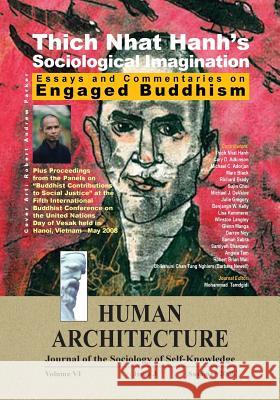Thich Nhat Hanh's Sociological Imagination: Essays and Commentaries on Engaged Buddhism » książka
Thich Nhat Hanh's Sociological Imagination: Essays and Commentaries on Engaged Buddhism
ISBN-13: 9781888024302 / Angielski / Miękka / 2008 / 162 str.
This Summer 2008 (VI, 3) issue of Human Architecture: Journal of the Sociology of Self-Knowledge is dedicated to an exploration of Thich Nhat Hanh's Engaged Buddhist philosophy and spiritual theory and practice from a sociological and social scientific vantage point, to highlight the significance his teaching bears for the development of a self-reflective, globally humanist, and environmentally concerned, sociological imagination. Included are several talks, letters, and a poem, by Thich Nhat Hanh on the meaning and practice of Engaged Buddhism-in regard to issues ranging from war and conflict, the environment, food industry and consumption, and history of Engaged Buddhism. Other articles put his views in social science and sociological contexts, specifically exploring the overlapping landscapes of Engaged Buddhism with Pragmatism, Deep Ecology, sociological imagination, and ideological analysis. Other contributions are illustrative of the ways in which Thich Nhat Hanh's teachings have engaged contexts such as: international conflict; the classroom; urban policing; traumatized populations; economic theory; environmental crisis; and family loss and trauma. A critical commentary by a participant's experience of attending one of Thich Nhat Hanh's retreats in 2005 is also included, followed by a response from a representative of the Plum Village community in France. Contributors include: Thich Nhat Hanh, Winston Langley, Michael C. Adorjan, Benjamin W. Kelly, Julie Gregory, Samah Sabra, Darren Noy, Sujin Choi, Marc Black, Samiyeh Sharqawi, Richard Brady, Michael J. DeValve, Cary D. Adkinson, Robert Brian Wall, Glenn Manga, Angela Tam, Karen Hilsberg, Lisa Kemmerer, Bhikshuni Chan Tung Nghiem (Barbara Newell), Robert Andrew Parker, and Mohammad H. Tamdgidi (also as journal editor-in-chief). Human Architecture: Journal of the Sociology of Self-Knowledge is a publication of OKCIR: The Omar Khayyam Center for Integrative Research in Utopia, Mysticism, and Science (Utopystics). For more information about OKCIR and other issues in its journal's Edited Collection as well as Monograph and Translation series visit OKCIR's homepage.
This Summer 2008 (VI, 3) issue of Human Architecture: Journal of the Sociology of Self-Knowledge is dedicated to an exploration of Thich Nhat Hanhs Engaged Buddhist philosophy and spiritual theory and practice from a sociological and social scientific vantage point, to highlight the significance his teaching bears for the development of a self-reflective, globally humanist, and environmentally concerned, sociological imagination. Included are several talks, letters, and a poem, by Thich Nhat Hanh on the meaning and practice of Engaged Buddhism-in regard to issues ranging from war and conflict, the environment, food industry and consumption, and history of Engaged Buddhism. Other articles put his views in social science and sociological contexts, specifically exploring the overlapping landscapes of Engaged Buddhism with Pragmatism, Deep Ecology, sociological imagination, and ideological analysis. Other contributions are illustrative of the ways in which Thich Nhat Hanhs teachings have engaged contexts such as: international conflict; the classroom; urban policing; traumatized populations; economic theory; environmental crisis; and family loss and trauma. A critical commentary by a participants experience of attending one of Thich Nhat Hanhs retreats in 2005 is also included, followed by a response from a representative of the Plum Village community in France. Contributors include: Thich Nhat Hanh, Winston Langley, Michael C. Adorjan, Benjamin W. Kelly, Julie Gregory, Samah Sabra, Darren Noy, Sujin Choi, Marc Black, Samiyeh Sharqawi, Richard Brady, Michael J. DeValve, Cary D. Adkinson, Robert Brian Wall, Glenn Manga, Angela Tam, Karen Hilsberg, Lisa Kemmerer, Bhikshuni Chan Tung Nghiem (Barbara Newell), Robert Andrew Parker, and Mohammad H. Tamdgidi (also as journal editor-in-chief). Human Architecture: Journal of the Sociology of Self-Knowledge is a publication of OKCIR: The Omar Khayyam Center for Integrative Research in Utopia, Mysticism, and Science (Utopystics). For more information about OKCIR and other issues in its journals Edited Collection as well as Monograph and Translation series visit OKCIRs homepage.











